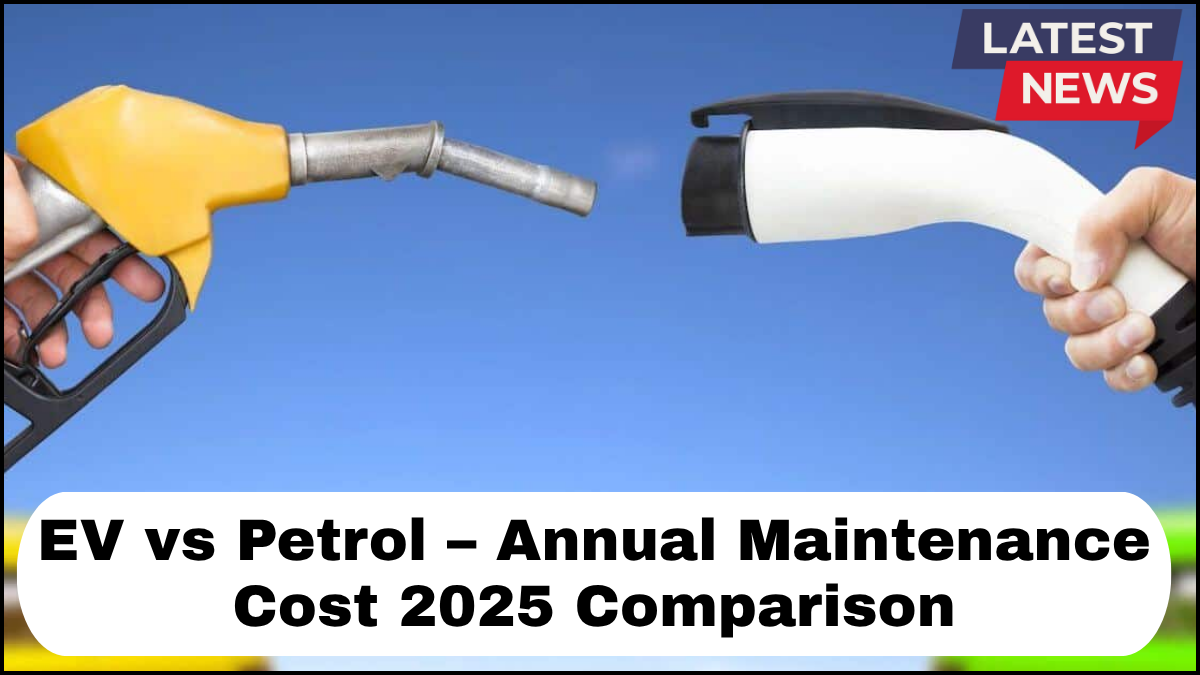With electric vehicles (EVs) becoming mainstream and fuel prices staying unpredictable, many car buyers in 2025 are weighing EV vs petrol maintenance cost more closely than ever before. Beyond the initial purchase price, long-term ownership costs—especially maintenance and servicing—play a critical role in deciding between electric and internal combustion engine (ICE) vehicles. This article presents a detailed comparison of annual maintenance costs between EVs and petrol cars, backed by data, real-world examples, and updated industry insights.

Understanding the Basics: How Maintenance Needs Differ
The fundamental difference between EVs and petrol vehicles lies in their mechanical complexity. Petrol engines require hundreds of moving parts working in harmony—pistons, timing belts, fuel pumps, exhaust systems, and more. Each of these components needs periodic checks, replacements, and servicing.
In contrast, electric vehicles have far fewer moving parts. There’s no oil to change, no timing belt to replace, no fuel system, and no exhaust emissions control systems. EVs rely mainly on a battery, electric motor, and software-driven systems.
Annual Maintenance Costs in 2025: A Head-to-Head Look
EV Maintenance Costs in 2025
-
Estimated Annual Maintenance: $300–$600 (varies by brand and usage)
-
Key Cost Drivers:
-
Tire wear and rotation
-
Brake pad checks (less frequent due to regenerative braking)
-
Coolant for battery systems
-
Software updates (often done over-the-air)
-
Cabin air filters and general inspections
-
Many EV manufacturers, such as Tesla, Hyundai, and Ford, now offer maintenance plans tailored for electric models, which often require fewer service center visits.
Petrol Vehicle Maintenance Costs in 2025
-
Estimated Annual Maintenance: $800–$1,200
-
Key Cost Drivers:
-
Engine oil and filter changes (every 5,000–10,000 miles)
-
Air and fuel filter replacements
-
Spark plug servicing
-
Timing belt and drive belt replacements
-
Emissions checks and exhaust system servicing
-
Petrol vehicles also tend to face wear-related repairs sooner, especially in urban stop-and-go conditions where engines are under more stress.
EV vs Petrol Running Cost Comparison: Not Just Maintenance
When evaluating EV vs petrol running cost comparison, it’s important to combine both maintenance and daily operational expenses.
-
Electricity Cost (EV): Charging at home averages around $0.10–$0.13 per kWh in most regions. A typical EV consumes about 30 kWh per 100 miles, translating to roughly $3–$4 per 100 miles.
-
Fuel Cost (Petrol): At $3.50 per gallon and 25 mpg average, it costs about $14 per 100 miles.
That means even before maintenance, EVs save owners approximately $1,000–$1,500 per year on fuel alone, depending on driving habits.
Longevity and Wear-and-Tear Considerations
Battery degradation is often raised as a concern for EVs. However, by 2025, most EVs come with battery warranties of 8–10 years, and real-world data shows many retain over 80% capacity after 100,000+ miles.
Petrol engines, while capable of high mileage, tend to show increased maintenance needs—especially after 5 years—with rising costs tied to aging components and emissions control failures.
Total Cost of Ownership (TCO): A Broader Perspective
Factoring in reduced maintenance, lower fuel costs, and fewer moving parts, the total cost of ownership for EVs in 2025 is significantly lower for most users.
| Cost Category | EV (Annual Avg) | Petrol (Annual Avg) |
|---|---|---|
| Maintenance | $400 | $1,000 |
| Fuel / Charging | $500 | $1,800 |
| Total Annual Running Cost | $900 | $2,800 |
Over a five-year period, that’s a potential saving of $9,500 in favor of EVs.
Conclusion: Is an EV Worth It in 2025?
If you’re looking at the EV vs petrol maintenance cost in 2025, EVs clearly come out ahead. Lower annual servicing requirements, combined with cheaper “fueling” costs, make electric vehicles a smarter long-term financial choice for most drivers. While the upfront price of EVs can be higher, ongoing savings in maintenance and running costs more than compensate, especially as EV technology matures and charging infrastructure expands.
Frequently Asked Questions (FAQ)
Q1: Are EVs cheaper to maintain than petrol cars in 2025?
Yes. On average, EVs cost 40–60% less to maintain annually due to fewer moving parts and less wear-prone systems.
Q2: Do EVs require oil changes?
No. EVs don’t use motor oil, so traditional oil changes are not needed.
Q3: What is the biggest maintenance expense for EV owners?
Tire replacement and rotation are among the top recurring costs, along with battery coolant checks.
Q4: How do maintenance schedules differ between EVs and petrol cars?
EVs have longer service intervals and fewer components needing attention. Petrol cars require more frequent servicing.
Q5: Is battery replacement a hidden cost in EVs?
Battery replacement is rare within the first 8–10 years. Most EVs retain good battery health well beyond 100,000 miles, and warranties typically cover degradation.
click here to learn more